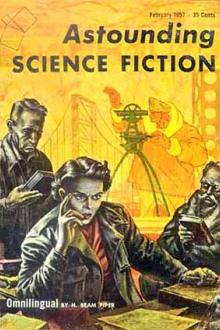A Tale of Two Cities - Charles Dickens (classic books to read .TXT) 📗

- Author: Charles Dickens
Book online «A Tale of Two Cities - Charles Dickens (classic books to read .TXT) 📗». Author Charles Dickens
Few children were to be seen, and no dogs. As to the men and women, their choice on earth was stated in the prospect—Life on the lowest terms that could sustain it, down in the little village under the mill; or captivity and Death in the dominant prison on the crag.
Heralded by a courier in advance, and by the cracking of his postilions’ whips, which twined snakelike about their heads in the evening air, as if he came attended by the Furies, Monsieur the Marquis drew up in his travelling carriage at the posting-house gate. It was hard by the fountain, and the peasants suspended their operations to look at him. He looked at them, and saw in them, without knowing it, the slow sure filing down of misery-worn face and figure, that was to make the meagreness of Frenchmen an English superstition which should survive the truth through the best part of a hundred years.
Monsieur the Marquis cast his eyes over the submissive faces that drooped before him, as the like of himself had drooped before Monseigneur of the Court—only the difference was, that these faces drooped merely to suffer and not to propitiate—when a grizzled mender of the roads joined the group.
“Bring me hither that fellow!” said the Marquis to the courier.
The fellow was brought, cap in hand, and the other fellows closed round to look and listen, in the manner of the people at the Paris fountain.
“I passed you on the road?”
“Monseigneur, it is true. I had the honour of being passed on the road.”
“Coming up the hill, and at the top of the hill, both?”
“Monseigneur, it is true.”
“What did you look at, so fixedly?”
“Monseigneur, I looked at the man.”
He stooped a little, and with his tattered blue cap pointed under the carriage. All his fellows stooped to look under the carriage.
“What man, pig? And why look there?”
“Pardon, Monseigneur; he swung by the chain of the shoe—the drag.”
“Who?” demanded the traveller.
“Monseigneur, the man.”
“May the Devil carry away these idiots! How do you call the man? You know all the men of this part of the country. Who was he?”
“Your clemency, Monseigneur! He was not of this part of the country. Of all the days of my life, I never saw him.”
“Swinging by the chain? To be suffocated?”
“With your gracious permission, that was the wonder of it, Monseigneur. His head hanging over—like this!”
He turned himself sideways to the carriage, and leaned back, with his face thrown up to the sky, and his head hanging down; then recovered himself, fumbled with his cap, and made a bow.
“What was he like?”
“Monseigneur, he was whiter than the miller. All covered with dust, white as a spectre, tall as a spectre!”
The picture produced an immense sensation in the little crowd; but all eyes, without comparing notes with other eyes, looked at Monsieur the Marquis. Perhaps, to observe whether he had any spectre on his conscience.
“Truly, you did well,” said the Marquis, felicitously sensible that such vermin were not to ruffle him, “to see a thief accompanying my carriage, and not open that great mouth of yours. Bah! Put him aside, Monsieur Gabelle!”
Monsieur Gabelle was the Postmaster, and some other taxing functionary united; he had come out with great obsequiousness to assist at this examination, and had held the examined by the drapery of his arm in an official manner.
“Bah! Go aside!” said Monsieur Gabelle.
“Lay hands on this stranger if he seeks to lodge in your village tonight, and be sure that his business is honest, Gabelle.”
“Monseigneur, I am flattered to devote myself to your orders.”
“Did he run away, fellow?—where is that Accursed?”
The accursed was already under the carriage with some half-dozen particular friends, pointing out the chain with his blue cap. Some half-dozen other particular friends promptly hauled him out, and presented him breathless to Monsieur the Marquis.
“Did the man run away, Dolt, when we stopped for the drag?”
“Monseigneur, he precipitated himself over the hillside, head first, as a person plunges into the river.”
“See to it, Gabelle. Go on!”
The half-dozen who were peering at the chain were still among the wheels, like sheep; the wheels turned so suddenly that they were lucky to save their skins and bones; they had very little else to save, or they might not have been so fortunate.
The burst with which the carriage started out of the village and up the rise beyond, was soon checked by the steepness of the hill. Gradually, it subsided to a foot pace, swinging and lumbering upward among the many sweet scents of a summer night. The postilions, with a thousand gossamer gnats circling about them in lieu of the Furies, quietly mended the points to the lashes of their whips; the valet walked by the horses; the courier was audible, trotting on ahead into the dull distance.
At the steepest point of the hill there was a little burial-ground, with a Cross and a new large figure of Our Saviour on it; it was a poor figure in wood, done by some inexperienced rustic carver, but he had studied the figure from the life—his own life, maybe—for it was dreadfully spare and thin.
To this distressful emblem of a great distress that had long been growing worse, and was not at its worst, a woman was kneeling. She turned her head as the carriage came up to her, rose quickly, and presented herself





Comments (0)